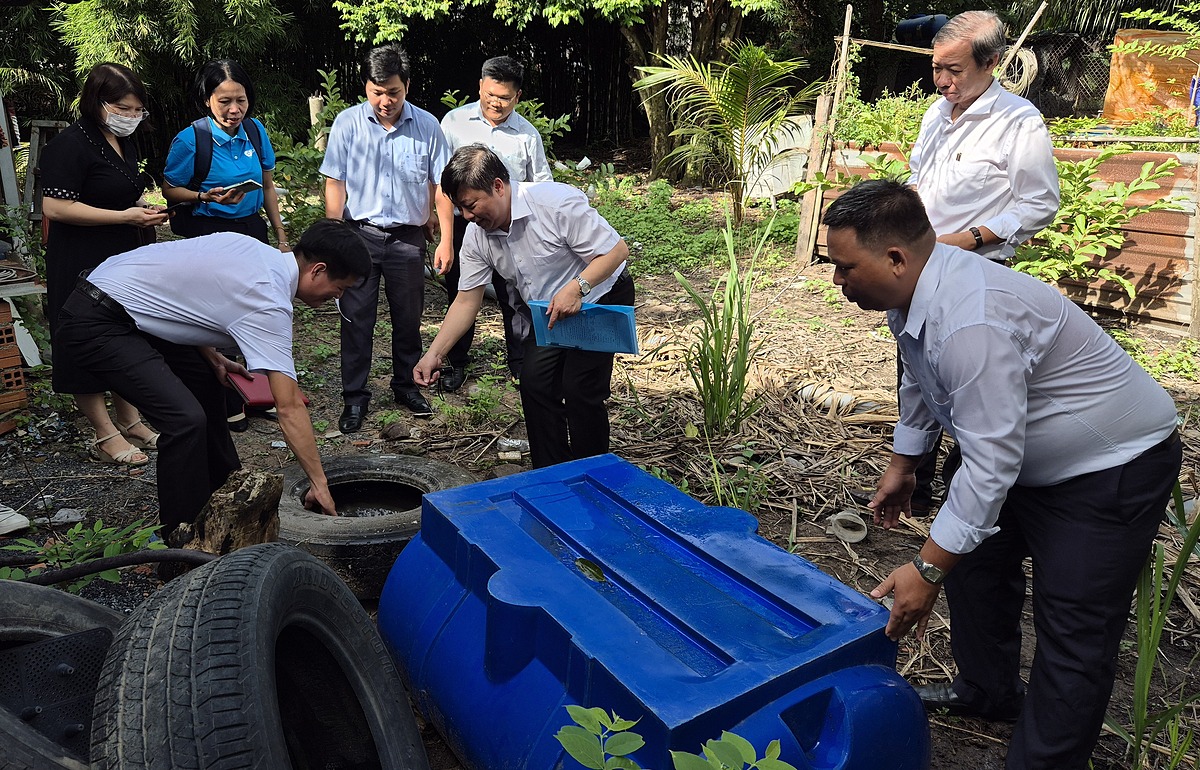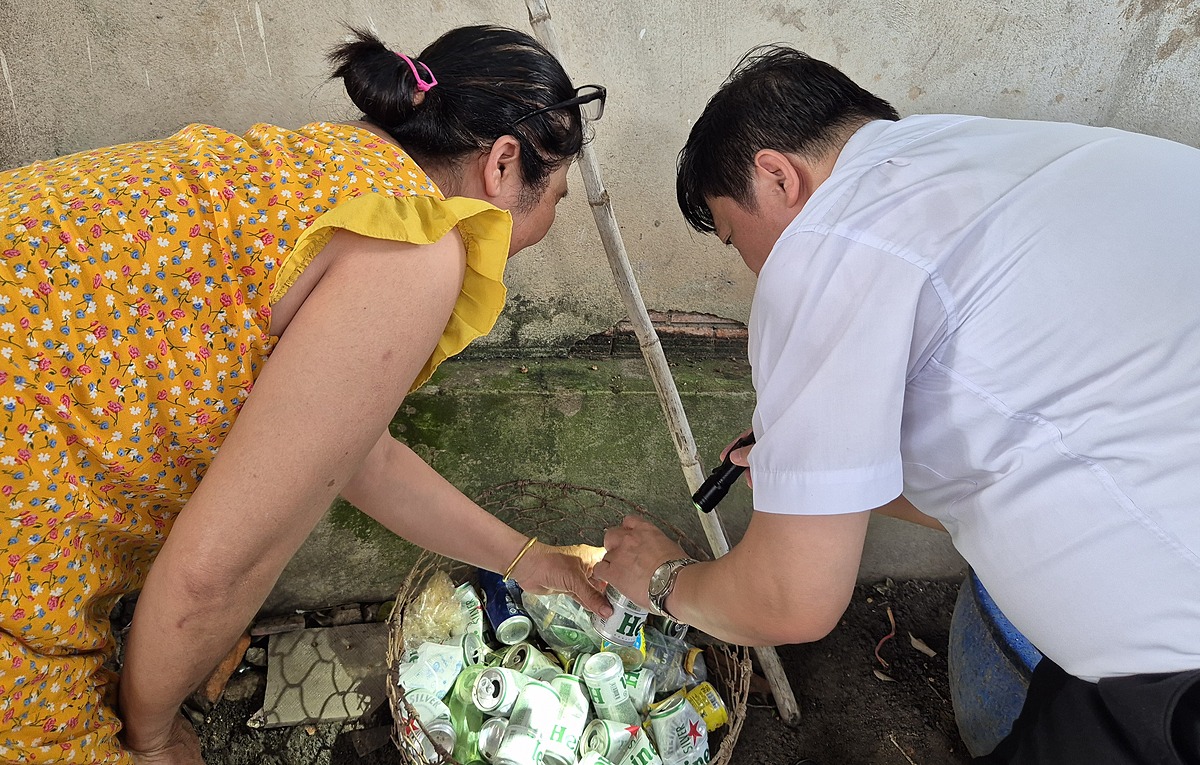On 15/7, Professor Nguyen Vu Trung, Director of the Pasteur Institute of Ho Chi Minh City, and a team conducted a field survey in high-risk areas such as tire repair shops, residential areas, and several households in Cu Chi. The team overturned various uncovered rainwater containers, including plant pots, cans, old tires, and water basins. These items provide ideal breeding grounds for Aedes mosquitoes, which transmit dengue fever and cause outbreaks.
Doctor Nguyen Trong Nghia, Deputy Director of the Cu Chi Medical Center, stated that the local authorities have intensified communication efforts through broadcasts, direct visits, and leaflet distribution. However, many residents remain complacent and haven't strictly adhered to preventative measures like covering water containers or clearing vegetation around their homes.
"Many people still store rainwater for livestock and gardening. This area has many industrial zones and worker accommodations, making communication challenging as workers are away from morning till night," Doctor Nghia explained.
 |
The inspection team discovered numerous items holding stagnant rainwater in the gardens of Cu Chi residents. Photo: Le Phuong |
The inspection team discovered numerous items holding stagnant rainwater in the gardens of Cu Chi residents. Photo: Le Phuong
Since the beginning of the year, Cu Chi district has recorded approximately 1,300 dengue fever cases, a 120% increase compared to the same period last year. This makes it the district with the second highest number of cases in Ho Chi Minh City, while in previous years, the disease was mainly reported in Thu Duc, Binh Chanh, and Binh Tan.
Cu Chi Regional General Hospital has also seen a sharp rise in dengue fever hospitalizations. From the beginning of the year until 14/7, the hospital admitted 722 cases, compared to only 65 cases during the same period last year. In the past two months, 20 to 30 children with dengue fever have been treated daily in the Pediatric Department, accounting for 20% of inpatient cases. The hospital receives specialized support from the Hospital for Tropical Diseases and Children's Hospital 1 in treating severe cases and coordinating patient transfers when necessary.
Doctor Le Hong Nga, Deputy Director of the Ho Chi Minh City Center for Disease Control, reported a rapid citywide increase in dengue fever cases, particularly in the last month, as the city entered the peak of the rainy season, creating favorable conditions for disease-carrying mosquitoes. Since the start of the year, the epidemic has trended upwards with weekly cases exceeding those of the previous year, bringing the total number of cases to 150% of the 2024 figure. Ho Chi Minh City has recorded 6 dengue fever deaths, including two in Binh Duong and one in Ba Ria - Vung Tau.
The Director of the Pasteur Institute of Ho Chi Minh City urged local authorities to strengthen disease control efforts, especially public awareness campaigns. "Without larvae, there will be no dengue fever. Making every household aware of this is crucial," Mr. Trung stated.
 |
Cans left outdoors filled with rainwater, containing mosquito larvae. Photo: Le Phuong |
Cans left outdoors filled with rainwater, containing mosquito larvae. Photo: Le Phuong
Nguyen Van Vinh Chau, Deputy Director of the Ho Chi Minh City Department of Health, requested local authorities to take action as soon as hospitals report "index cases." This aims to quickly locate and eliminate mosquito breeding sites to prevent the disease from spreading.
Local authorities need to re-evaluate risk areas, especially with the increasing number of cases and the potential emergence of new hotspots. For workers, direct communication at industrial zones or home visits in the evenings or on weekends should be implemented to minimize dengue fever cases and fatalities.
Individuals and businesses who repeatedly ignore warnings about mosquito larvae will face penalties, Doctor Chau warned. The "Online Healthcare" application continues to be used for reporting and monitoring the handling of these risk areas.
Residents should proactively eliminate mosquito larvae by locating and removing water containers that could serve as breeding sites. Cover buckets, containers, and water tanks when not in use and clean them regularly. Frequently change and clean flower vases, plant pot saucers, and offering cups, or introduce mosquito-eating fish into rockeries and aquatic plants. Infrequently used water containers for household purposes should be arranged and covered to prevent water stagnation.
To kill and prevent mosquito bites, people should sleep under mosquito nets and use mosquito repellent sprays, coils, creams, and swatters. Everyone should also cooperate with health authorities in mosquito larvae eradication campaigns and chemical spraying for disease prevention. If you experience fever, seek immediate medical attention for diagnosis and treatment; do not self-treat.
Le Phuong












